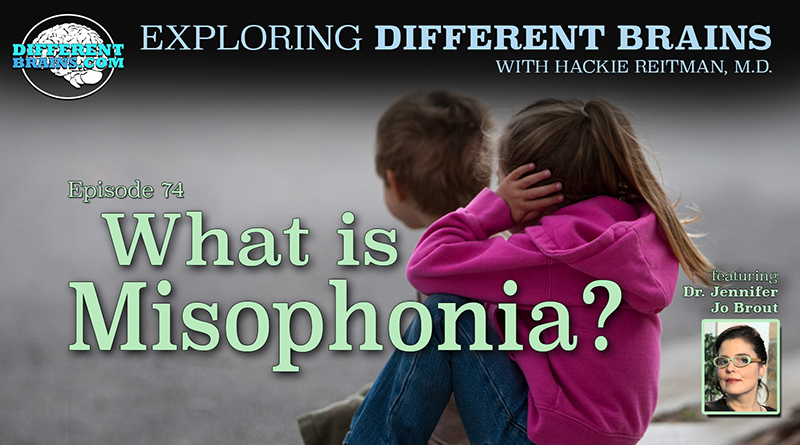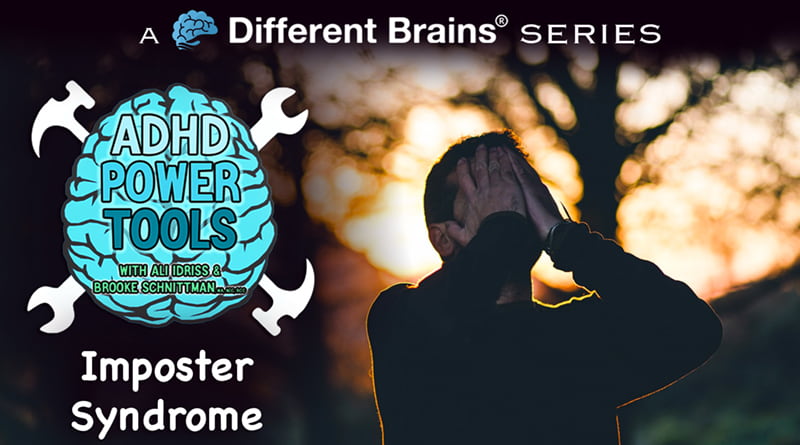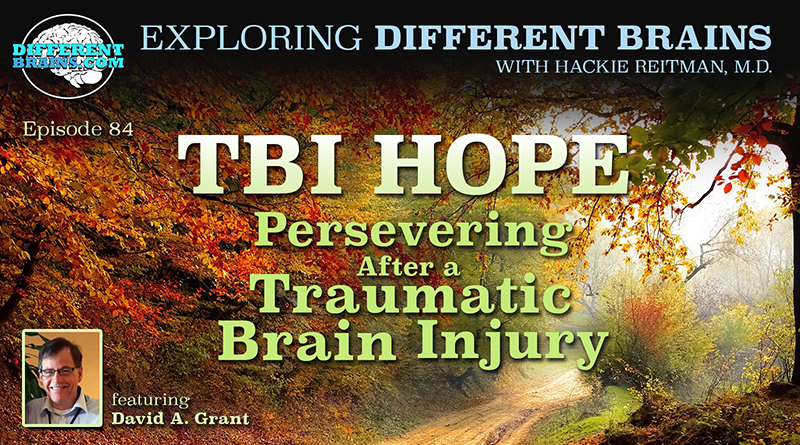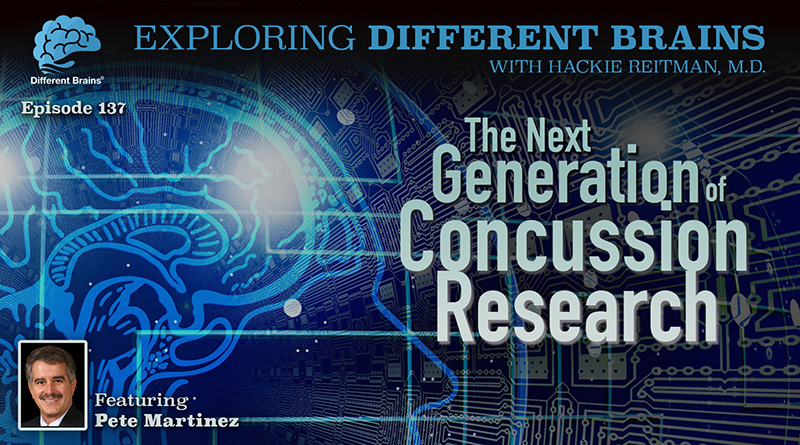
What Is Misophonia? with Dr. Jennifer Jo Brout, founder of Duke University’s Sensory Research Program | EDB 74
In this episode, Hackie Reitman, M.D. speaks with psychologist and counselor Jennifer Jo Brout, Psy.D. Dr. Brout is one of the world’s authorities on the misunderstood condition known as Misophonia, and has the condition herself. She established the Duke University Sensory Processing and Emotion Regulation Program, and is the founder of the International Misophonia Research Network. Dr. Brout defines what Misophonia is, discusses common triggers, and talks about the ongoing struggle to get support in finding treatment and support.
For more about Misophonia and Dr. Brout, visit:
https://www.misophoniainternational.com/
http://misophonia-research.com/
For information about the Duke University Sensory Processing and Emotion Regulation Program, visit: http://dukescience.org/content/misophonia
And, to read the blogs Dr. Brout has written for Different Brains, click here.
38 Second Preview:
To listen or download the audio-only, podcast version of this episode, see the embedded player below.
Or look for us on your favorite podcast provider:
iTunes | Stitcher | SoundCloud
[expand title=”Click Here to View Full Transcript”]
HACKIE REITMAN, M.D. (HR): Hi I’m Dr. Hackie Reitman, welcome to another episode of Exploring Different Brains. Today I am thrilled to be talking with Jennifer Jo Brout, who not only has a terrific education; she’s the first one ever to tell me the entity that she herself suffers from. It’s called misophonia and I had no idea it was so common and in addition to being a school psychologist and having a million degrees and doing so much for so many. Jennifer Jo Brout tell us what’s going on? Welcome to the show.
JENNIFER JO BROUT (JB): Thank you very much it’s really nice to be here.
HR: Well lets start out telling people who the heck you are.
JB: Ok. Well I am a psychologist and a counselor in Connecticut. I have misophonia a lot of people call it misophonia so there is a lot of different pronunciations but I go with misophonia. I have misophonia and my daughter also suffer from misophonia. About 20 years ago I started to study this condition although under a different name because we didn’t’ really have a name for it back then. I have started research programs, I have won ongoing program at Duke University with Dr. Zachary Rosenthal. I have some research programs at NYU and have had various other things along the way. Really the bottom line is for 20 years I’ve been trying to raise interest and funding for this disorder.
HR: Well lets remove the suspense for our audience and lets remove the suspense from out audience and tell us what is the mysterious misophonia.
JB: Well it is somewhat mysterious. There’s really not an agreed upon definition of what it is at this point of course it’s not in any diagnostic manuals so there is not a parameter or a description that everybody agrees on. However having said that it is a disorder that has been described by the people who termed it which are the jasterbufs as a disorder of decreased sound tolerance. Within decreased sound tolerance specific noises some of which are repetitive some of which are pattern based and these noises when they’re processed seem to ignite a fight flight reaction or at least a high level autonomic nervous system reaction that is atypical of the rest of the population. Another way to say that that is a little easier is that people with misophonia have brains that misinterpret sensory or auditory stimuli as toxic harmful dangerous and the body goes into its natural defensive state.
HR: Well here’s the day I describe it after reading about it.
JB: ok
HR: The way I’m looking at it having no where near the knowledge you do just as a lay person the way that it is to me certain people, certain routine sounds could be breathing or chewing whatever, for some reason in those individuals the part of the brain that is the center for called violence or fight or flight or all of these different overlapping areas, road rage ha-ha. On the newer scans and studies that part of the brain lights up in misophonia and they fly into a fight or flight or a violence or just not a case of gee it bothers me like chalk on a blackboard, no no no this is a big deal. Did what I just say make sense or am I off the path?
JB: Yeah you are not that off the path, there has been some I think exaggeration in a lot of the press reports and misunderstanding with the association of violence. What we know physiologically if you were to measure somebodies reaction physiologically you would see the fight, flight response or you would see again the defensive motivational stimulant so when it goes up when you’re under attack however, the emotion that people associated it with could be rage, could be anxiety, could be shutting down, could be crying. It doesn’t necessarily doesn’t have to be rage and a lot of the time it actually is not. There has been a couple of books written calling it sound rage or chewing rage and I don’t think that’s the best way to characterize it although this certain feeling of being enraged is something that some people and a lot of people experience but it’s not the only feeling the only emotion that you would put to go together with this physiological response.
HR: Now tell us about your organization
JB: okay, well I have a long standing organization called sensation and emotion network which I have had for almost 15 years and what we’ve done there is try to network researchers who are interested in how sensory processing affects emotion regulation. So that’s where all this started. Then when misophonia actually got it’s name and became known in the press and I saw in the symptoms that lined up with misophonia were closer to what I was looking at; I moved my efforts towards specifically misophonia and I started a network called the International Misophonia Research Network and what I’ve tried to do there is get a number of researchers who are either already involved in misophonia or who I can lure into being interested in misophonia together and actually network which is clearly very important and doesn’t come easily.
So right now a number of us just finished a lit review on the small but emerging body of misophonia research and we are working on potential conferences online. We did a webinar that was free from Duke where we just went over the very basic tenants of misophonia. We’re planning a few more of those and in addition I’m trying to encourage people who suffer from this to help fundraise because as you probably know when you’re dealing with a “new disorder” or an “unknown disorder” the funding from the government does not come flooding in to say the least.
HR: Well why don’t you tell our audience how they can get ahold of you, our expanding and growing different brains audience who are a lot of wonderful people, many of them who have their own kinds of different brains like we all have and tell them how they would get in touch with you to get involved or to donate or find out more.
JB: Wonderful, they can email me at jbrout@gmail.com which is just jbrout@gmail.com or they can go online at international misophonia research network and go through the website. For people if there is anyone out there who to donate to the program at Duke it’s just dukescience.org
HR: You’re at Duke, you’re at NYU, you’re doing so many different things. Now lets take our audience through some of the basics because what I like to do and try to do like I did with our book Aspertools is just give real tools you can use so first lets start go back and say I’m out there I think I might have misophonia what do I do? Start with that. What do I do? Who do I ask?
JB: Well unfortunately there are not a lot of people to go to yet. But if you can find the right people the first thing I would say to do is to get as educated as one can about what is known about the disorder and try to separate out some of the hype versus some of the reality and evidence based research.
HR: Let me stop you there for a minute to say on your website do you have a list or anybody to call, can someone call. For instance if I think my child has autism I can call a lot of different I can call CARD at the University of Miami, is there some place someone can call or email?
JB: Yes and no. They can certainly call me. They can call there is a Misophonia association in Oregon, there is Misophonia International which is a wonderful new site that I’m affiliated with, and everyone has kind of a different view of what this disorder is so I like to think my site is very stringent in terms of what misophonia is, what we know, what we don’t know.
HR: Ok so lets repeat your site.
JB: My site is MisophoniaInternational and MisophoniaInternationalResearchNetwork
HR: Are those .coms or .orgs?
JB: They are .com, I don’t take any, we’re not a nonprofits so what I try to do which I thought was a very interesting paradigm is I have identified really terrific researchers for misophonia. People who are very cost disciplinary oriented who look at things at sort of a processing perspective not a pathology perspective and what I try to do is direct people to donate directly to these programs so that we can support these researchers who are willing to be supportive of understanding our disorder.
HR: Understood. So now I figured out who to go to and I have misophonia and what are some of some of the simple tools that I can use to help me off, you know.
JB: I should mention we started a provider network and it’s very small right now but we’re obviously trying to expand it. And we are including nurses, psychologist, occupational therapists, audiologists obviously. Because this is a condition that crosses over many different disciplines we are trying to gather many different types of clinicians as well as researchers. So we have started that provider network which is misophoniaproviders.com unfortunately it takes time because we have to train everybody in just the basic understanding of what the disorder is. I think the first thing a person should do in terms of coping 1. Realizing we don’t have a real treatment yet so if you’re looking for a treatment or a cure we don’t have that yet. A lot of people unfortunately get sort of lured into and I know this certainly with a lot of disorders but lured into these 90% rate cure treatments and there aren’t any. However nobody should be losing hope because there are coping mechanisms that we’re developing a program for example at Duke that can be very effective.
The coping mechanisms are and depending of course on what age, there are adults with this; there are children with this. So the coping mechanisms involve I guess what teachers would call metacognition so an awareness of what you’re thinking and awareness of what your body is doing in response to these sounds and trying to separate out the physiological response from the emotion. Kind of like what I was talking about before. If you’re in fight flight you don’t have to name that rage and you start to separate out two kinds of constructs or one is a construct the other is a physiological reaction and that is you know a skill that I try to help people build through counseling and we’re trying to train other people to do. Because then once you removed the emotion word from it you then can understand it physiologically and then people tend to assign other people as their triggers much less when there is little separation between your body is doing and what your mind is doing. So it’s kind of a real separation but it’s somewhat artificially you know instilled in order to cope. The other thing I would say since often there are relational issues that manifest as a result of this. There is a lot of family therapy.
HR: Marriage counseling.
JB: Yes, absolutely. Marriage counseling, family therapy, even helping people cope in the work situation we’re trying to give accommodation letters that make sense to people in the work place. I’ve written a few letters, I have a few letters sample ones online that people are free to use as samples kind of just explaining in details this is a neurophysiological issue it’s not an emotional problem, it’s not a psychiatric disorder, it’s a processing issue and it’s real and the last thing would be working on stigma. A lot of people feel of course very stigmatized by having this which is just terribly unfortunate, I don’t feel that way obviously and that’s another course of action; to remove stigma.
HR: Now what are some of the specific roadblocks that you’re running into in your quest to eliminate the stigma, to make it more known, to get better funding for it; what are you running into?
JB: Roadblocks, mostly roadblocks unfortunately. While I’d like to be more positive the road blocks in terms of my associate Shaylyne Hays who runs the misophonia international site does an extraordinary job of getting out as much material as she can. However as you know when you’re starting from scratch with something that has just been named, well of course there is no funding from the national institute of health and I would imagine even if there were, this would not be top of the list and that’s understanding because the NIH has a certain amount of funding and they have to prioritize things that are life threatening and severely life altering and while this can be life altering in some cases severely life altering, certainly it’s just not on the radar of the national institute of health.
Really the best thing we can do is private funding and my hope was that there would be crowd source funding going on. It’s interesting too I should mention that in my opinion and the opinion of other people who I feel are certainly very qualified to state this; misophonia as a disorder may stand by itself, however the symptoms of misophonia are within many disorders. So you see it in autism, just over responsively to certain sounds. You see it in sometimes schizophrenia. You see it in fibro myalgia. You see it with people with migraines. The lens that one needs to look through is this lens of sensory processing.
HR: Well let me interrupt you there to say lets take Autism and Asperger’s for instance, I was completely ignorant of the fact that my daughter Rebecca who has Asperger’s, that all of her senses were hyper, touch, smell, sound, light, everything. Once I became aware of it, it was a whole different ball game. But now how would one differentiate between or is it necessary to differentiate between someone on the spectrum who simply has hyper senses versus someone on the spectrum since we known none of these things are occur in isolation who also has misophonia.
JB: You know it’s interesting because in my point of view when I originally came back into action when I saw misophonia was named. I thought it was just the auditory component of sensory over responsivities. So when you’re saying the sensory hyper responsivities I would just call them sensory over responsivities, but we’re talking about the same thing. So for me the description of someone who is sensory over responsive is somebody who responds to sensory stimuli in one or more domains with a much escalated nervous system arousal and possibly goes fight flight. So there is a real cross over.
I think what the difference is here is that with Misophonia it’s very specific to the auditory modality and a little bit with the visual. But one thing I can tell you, I can’t tell you if with brain imaging if it would all pan out to be the same, the physiological response to the stimuli is the same or at least extremely similar for people with autism, people with what used to be called Asperger’s before they took it out of the DSM. Don’t get me started on the DSM. So the physiological response is the same. There are kids and adults who have sort of the full range of sensory over responsively who as you know people with Asperger’s or autism goes through the day with just these incredible nervous system ups and downs. When you start looking through that lens of sensory processing, it really changes how you look at behavior which is what you were saying because you see these affect deregulation in certain behaviors as a result of being over stimulated and in some cases under responsive and it just changes the way one looks at human development and it’s something I think psychiatry has dropped the ball on and has not picked it back up unfortunately.
HR: Jennifer one more time please tell our audience how they can get ahold of you and learn more.
JB: They can just email me at jbrout@gmail.com again that is jbrout@gmail.com or again the misophonia international website or the international misophonia research network, the research is more for researchers so I would say through misophoniainternational.com
HR: Jennifer Jo Brout thank you so much for being here as a guest at DifferentBrains.com; I’ve learned so much today and I’m sure our audience has not only about misophonia but about the sensory and emotional interplay and the de-pathologicalization, I think I just invented a new word like misremembering.
JB: Misremembering yes ha-ha de-patholigizing yes ha-ha well I like it either way, it works.
HR: Thank you very much for being with us today.
JB: Thank you very, very much
[/expand]
This video is owned by Different Brains Inc, kindly donated by it’s original producer PCE Media LLC.
Different Brains® Inc. founder Harold “Hackie” Reitman, M.D. is an author, filmmaker, retired orthopedic surgeon, former professional heavyweight boxer, the past chairman and president (and current board member) of The Boys and Girls Clubs of Broward County, and a neurodiversity advocate. However, it was his role as a father that led to the creation of the DifferentBrains.org website.
Hackie’s daughter Rebecca grew up with epilepsy, 23 vascular brains tumors, and underwent 2 brain surgeries before the age of 5. Her struggles and recovery put him on the road to, through 26 professional heavyweight boxing matches, raising money for children’s charities (to which he donated every fight purse).
Rebecca eventually went on to graduate from Georgia Tech with a degree in Discrete Mathematics, and Dr. Reitman wrote and produced a film based on her experiences there (The Square Root of 2, starring Darby Stanchfield of ABC’s Scandal). After graduation, Rebecca received a diagnosis of Asperger’s syndrome. Hackie, shocked at his own ignorance of the topic despite being an M.D., embarked on years of research that culminated with his book Aspertools: The Practical Guide for Understanding and Embracing Asperger’s, Autism Spectrum Disorders, and Neurodiversity (released by HCI books, publishers of the Chicken Soup for the Soul series).
This experience revealed to Hackie the interconnectedness of the conditions that fall under the neurodiversity umbrella, while alerting him to the in-fighting and fractured relations that often plague the organizations tasked with serving the community. Convinced that overcoming these schisms could help all of society, Hackie forged the Different Brains philosophy of inclusive advocacy: “Supporting Neurodiversity – From Autism to Alzheimer’s and All Brains In Between”.
In the company’s initial years of operation, Hackie self-financed all of the content on DifferentBrains.org, all of which offered free to view to the public. Currently he is the host of our weekly interview show Exploring Different Brains, writes blogs for the site, and tours the country speaking at conferences, conventions and private functions, all with the goal of improving the lives of neurodiverse individuals and their families, and maximizing the potential of those with different brains. Separate from Different Brains, Hackie is the founder and CEO of PCE Media, a media production company focusing on reality based content. He recently co-executive produced the documentary “Foreman”, the definitive feature documentary on legendary boxer and pitchman George Foreman.




